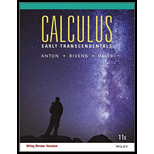
In each part, determine where
(a)
(b)
(c)
(d)
(e)
(f)
(g)
(h)
(i)
Want to see the full answer?
Check out a sample textbook solution
Chapter 2 Solutions
Calculus Early Transcendentals, Binder Ready Version
Additional Math Textbook Solutions
Precalculus: Concepts Through Functions, A Unit Circle Approach to Trigonometry (4th Edition)
Thomas' Calculus: Early Transcendentals (14th Edition)
Precalculus: Mathematics for Calculus (Standalone Book)
Precalculus (10th Edition)
Glencoe Math Accelerated, Student Edition
Precalculus: Mathematics for Calculus - 6th Edition
- What is the purpose of the Intermediate Value Theorem?arrow_forwardDetermine the domain of the function and prove that it is continuous on its domain using the Laws ofContinuity and the facts quoted in this section. f (x) = 2 sin x + 3 cos xarrow_forwardFind the minimum value of ∣sin x + cos x + tan x + cot x + sec x + csc x∣ for real numbers x.arrow_forward
- Let y=f(x)=sin^2(x)-cos(x)+2sin(x)+x find f'(x), factor f'(x) and determine the critcal values on the interval [0,2pi) solve for xarrow_forwardfind the most general ntiderivative f(x) = 4 sec2(x) + 3 sec x tan xarrow_forwardDifferentiate. f(x) = x cos(x) sin(x) (please write it out on paper)arrow_forward
 Mathematics For Machine TechnologyAdvanced MathISBN:9781337798310Author:Peterson, John.Publisher:Cengage Learning,Algebra & Trigonometry with Analytic GeometryAlgebraISBN:9781133382119Author:SwokowskiPublisher:Cengage
Mathematics For Machine TechnologyAdvanced MathISBN:9781337798310Author:Peterson, John.Publisher:Cengage Learning,Algebra & Trigonometry with Analytic GeometryAlgebraISBN:9781133382119Author:SwokowskiPublisher:Cengage College Algebra (MindTap Course List)AlgebraISBN:9781305652231Author:R. David Gustafson, Jeff HughesPublisher:Cengage Learning
College Algebra (MindTap Course List)AlgebraISBN:9781305652231Author:R. David Gustafson, Jeff HughesPublisher:Cengage Learning


